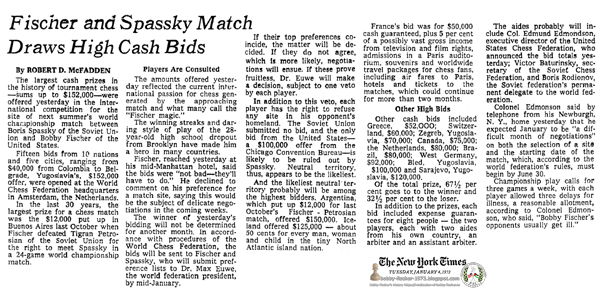New York Times, New York, New York, Tuesday, January 04, 1972 - Page 30
Fischer and Spassky Match Draws High Cash Bids by Robert D. McFadden
The largest cash prizes in the history of tournament chess—sums up to $152,000—were offered yesterday in the international competition for the site of next summer's world championship match between Boris Spassky of the Soviet Union and Bobby Fischer of the United States.
Fifteen bids from 10 nations and five cities, ranging from $40,000 from Colombia to Belgrade, Yugoslavia's, $152,000 offer, were opened at the World Chess Federation headquarters in Amsterdam, the Netherlands.
In the last 30 years, the largest prize for a chess match was the $12,000 put up in Buenos Aires last October when Fischer defeated Tigran Petrosian of the Soviet Union for the right to meet Spassky in a 24-game world championship match.
PLAYERS ARE CONSULTED
The amounts offered yesterday reflected the current international passion for chess generated by the approaching match and what many call the “Fischer magic.”
The winning streaks and daring style of play of the 28-year-old from Brooklyn have made him a hero in many countries.
Fischer, reached yesterday at his mid-Manhattan hotel, said the bids were “not bad—they'll have to do.” He declined to comment on his preference for a match site, saying this would be the subject of delicate negotiations in the coming weeks.
The winner of yesterday's bidding will not be determined for another month. In accordance with procedures of the World Chess Federation, the bids will be sent to Fischer and Spassky, who will submit preference lists to Dr. Max Euwe, the world federation president, by mid-January.
If their top preferences coincide, the matter will be decided. If they do not agree, which is more likely, negotiations will ensue. If these prove fruitless, Dr. Euwe will make a decision, subject to one veto by each player.
In addition to this veto, each player has the right to refuse any site in his opponent's homeland. The Soviet Union submitted no bid, and the only bid from the United States—a $100,000 offer from the Chicago Convention Bureau—is likely to be ruled out by Spassky. Neutral territory, thus, appears to be the likeliest.
And the likeliest neutral territory probably will be among the highest bidders. Argentina, which put up $12,000 for last October's Fischer-Petrosian match, offered $150,000. Iceland offered $125,000 — about 50 cents for ever man, woman and child in the tiny North Atlantic island nation.
France's bid was for $50,000 cash guaranteed, plus 5 per cent of a possibly vast gross income from television and film rights, admissions in a Paris auditorium, souvenirs and worldwide travel packages for chess fans, including air fares to Paris, hotels and tickets to the matches, which could continue for more than two months.
OTHER HIGH BIDS
Other cash bids included Greece, $52,000; Switzerland, $60,000; Zagreb, Yugoslavia, $70,000; Canada, $75,000; the Netherlands, $80,000; Brazil, $80,000; West Germany, $92,000; Bled, Yugoslavia, $100,000 and Sarajevo, Yugoslavia, $120,000.
Of the total prize, 67½ per cent goes to the winner and 32½ per cent to the loser.
In addition to the prizes, each bid included expense guarantees for eight people — the two players, each with two aides from his own country, an arbiter and an assistant arbiter.
The aides probably will include Col. Edmund Edmondson, executive director of the United States Chess Federation, who announced the bid totals yesterday; Victor Baturinsky, secretary of the Soviet Chess Federation, and Boris Rodionov, the Soviet federation's permanent delegate to the world federation.
Colonel Edmondson said by telephone from his Newburgh, N.Y. home yesterday that he expected January to be a “difficult month of negotiations” on both the selection of a site and the starting date of the match, which, according to the world federation's rules, must begin by June 30.
Championship play calls for three games a week, with each player allowed three delays for illness, a reasonable allotment, according to Colonel Edmondson, who said, “Bobby Fischer's opponents usually get ill.”

























